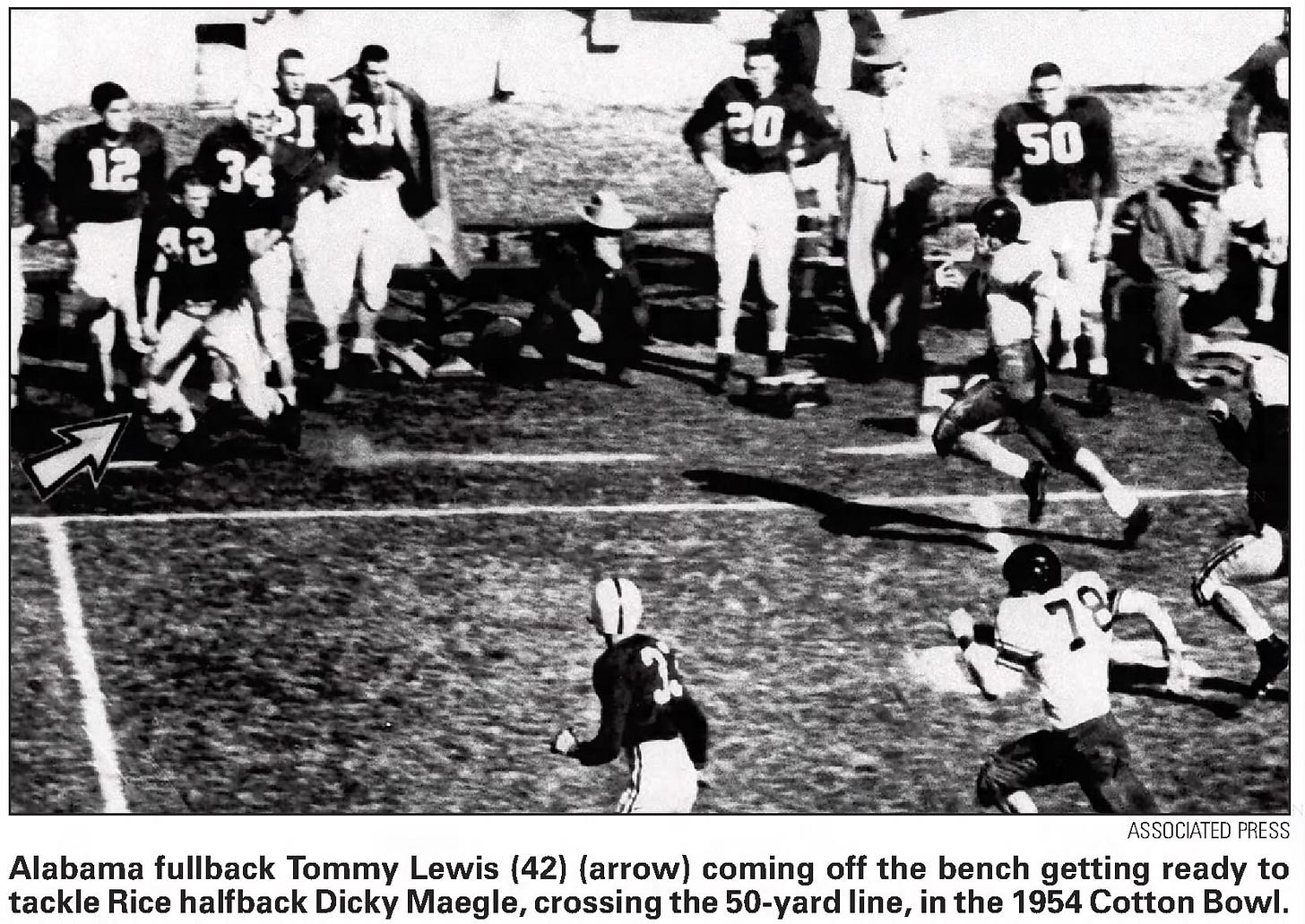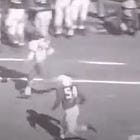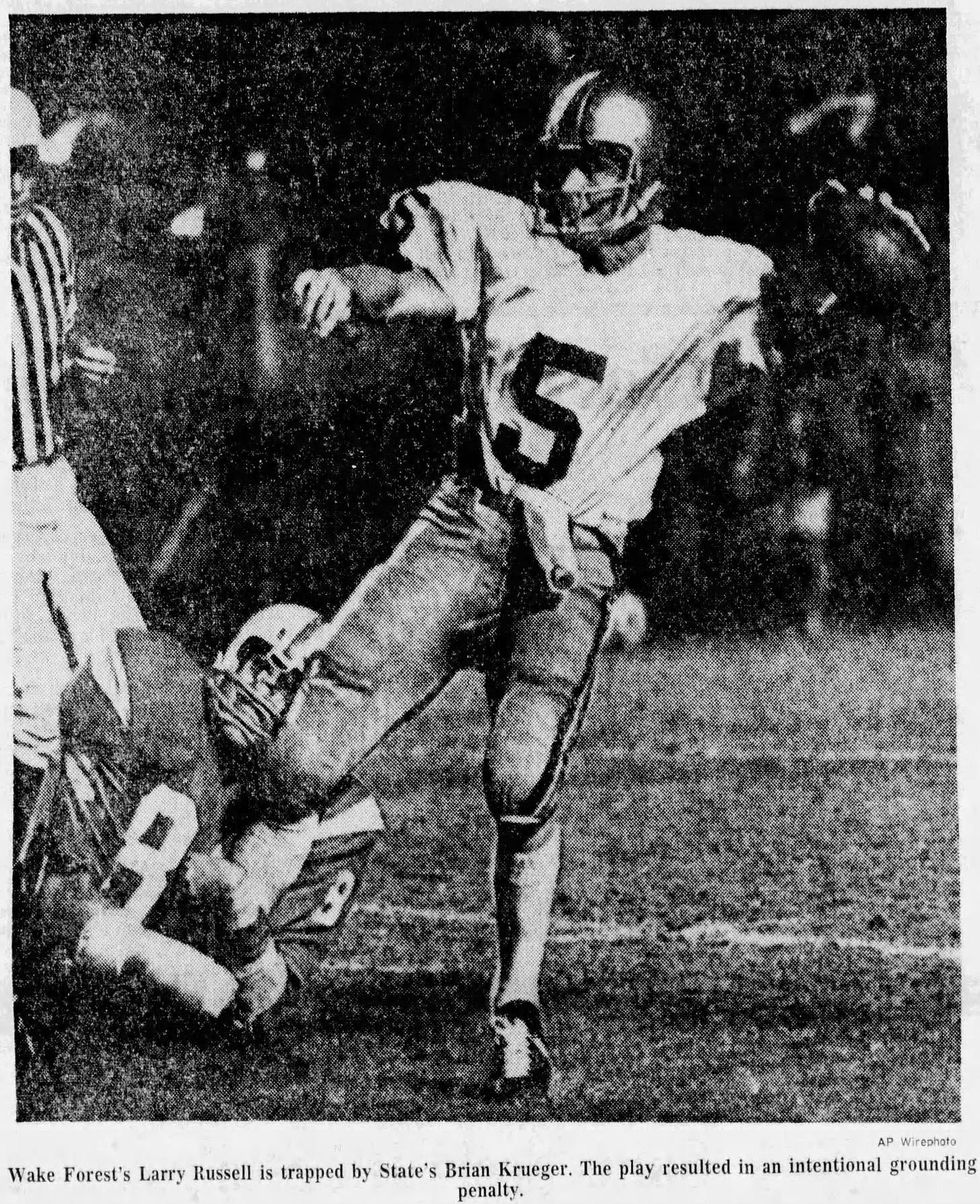Today's Tidbit... Unfair Acts and the 12th Man
A Tidbit of one month ago described several ways in which a football referee can award points - or used to be able to award points. It can happen today is due to an Unfair Act since the rules give the referee the authority to make essentially any call necessary to remedy an unfair act, including a palpably unfair act in NFL parlance.
One set of unfair acts occurs when players come off the bench, or fans leave the stands to interfere with play. Since I promised to do a story focused on those events, today is the day I make good on that promise.
I'll cover four such events, but if you know of others, please comment below.
1918 Great Lakes Naval @ Naval Academy
With millions of men in Army and Navy training camps during WWI, the camps created athletic teams filled with former, current, and future college stars. The Great Lakes Naval Training Station had more than 40,000 men to choose from in building their team, and while they started slow, they improved following a coaching change. A rout of highly regarded Rutgers left them 4-0-2 heading into their game at Annapolis.
In a tightly contested game, the Midshipmen led 6-0 with minutes left, ready to score to seal the game with the ball on the Great Lakes 2-yard line. Things did not look good for Great Lakes until Navy ran the ball up the middle and fumbled, with the ball popping into the air. Harry Eielson, a Great Lakes end, caught the ball three yards behind the goal line and began sprinting toward the other goal line, more than one hundred yards away.
Eielson picked up several blocks and broke into the clear with three teammates trailing him down the sideline, each in position to block any Midshipmen approaching Eielson from behind. As Eielson raced past the Navy bench, Bill Saunders, a Navy substitute, came off the sideline, onto the field, and tackled Eielson.
There were punches thrown until the officials intervened. While the officials discussed how to handle the play when the Unfair Acts rule had not yet been adopted, the Naval Academy commandant came onto the field and ordered the officials to award Great Lakes the touchdown. That sealed it. Great Lakes received six points, earned another on a successful kick, and won 7-6, sending them on their way to the 1919 Rose Bowl.
1940 Michigan @ California
Michigan opened the 1940 with a road trip to play the California Golden Bears for the first time. Michigan's star, Tom Harmon, won the Heisman Trophy at season's end, and he helped his campaign by scoring four touchdowns, throwing for another, and kicking four extra points.
While it was a memorable day for Harmon, the day is best remembered for the Cal fan, Harold "Bud" Brennan, who came onto the field to stop Harmon's third touchdown run, only to fail in the attempt.
The video below shows Harmon's run and his stiff arming the would-be tackler.
The following video is fun and provides the story behind Harold Brennan's ill-fated attempt.
Of course, since Brennan did not make the tackle, the referee did not need to make an Unfair Act ruling, though a local judge ruled against Brennan several days later.
1954 Cotton Ball
An Unfair Act occurred in the 1954 Cotton Bowl game when Bart Starr quarterbacked the Alabama Crimson Tide against the Rice Owls. Whereas the previous examples involved a substitute and a fan interfering with the game, the 1954 Cotton Bowl had one of the game's stars playing the role of the interferer.
The game began with Tommy Lewis, Alabama's fullback, making several nice runs on their first drive, culminating in a touchdown to give Bama a 6-0 lead. On the first play of the second quarter, Rice's Dicky Meagle loped to a 79-yard touchdown run. Later in the quarter, a Starr fumble and Rice penalty gave Rice the ball on their own 5-yard line, at which point they gave the ball to Meagle again, who swept to right, right down the sideline.
Alabama fullback Tommy Lewis, who was out of the game and sitting on Alabama's bench at the time, chose to insert himself into the action and tackled Meagle as he passed by Bama’s bench. Of course, the officials awarded Meagle the touchdown as Rice went on to win 28-6.

1971 Wake Forest @ North Carolina State
Another fun Unfair Act comes to you courtesy of reader Carter Claiborne, who alerted me to this story.
Wake Forest visited North Carolina State in October 1971, expecting to win. However, trailing 15-0 at the start of the fourth quarter, Wake Forest fought back to score two touchdowns but missed on their second two-point conversion attempt, so they trailed 15-14 with 1:19 left. Wake Forest flubbed its onside kick attempt but held NC State on downs, resulting in an NC State punt attempt, which Wake Forest blocked to gain decent field position.
Following a Wake penalty and an 18-yard gain, Wake's kicker ran onto the field as the seconds ticked off the clock to attempt a 51-yard field goal for the win. Whether it was a bad snap or rushed kick, the ball fluttered toward one sideline, where NC State's Bill Miller caught it and began sprinting down the sideline.
As Miller ran toward the end zone to cap their win, Wake Forest's quarterback, Larry Russell, came off the bench and tackled Miller. The officials awarded NC State the touchdown after time had run out, giving them a 21-14 victory.
Unfortunately, I could not find any images or video of the play, so I have included a picture of Russell being tackled earlier in the game and penalized for intentional grounding.
So, the next time you're up against it, the breaks are beating the boys, and things aren't going your way, go out there with all you've got and win one for Bill Saunders, Harold "Bud" Brennan, Tommy Lewis, or Larry Russell. You'll feel better for a minute or two, but your team will still lose the game.
Football Archaeology is reader-supported. Click here to buy one of my books or otherwise support the site.







Brings to mind the play from 1961 where a Boston Patriots fan entered the field for the final play of the game: https://youtube.com/watch?v=YoeBmCNX1Ho